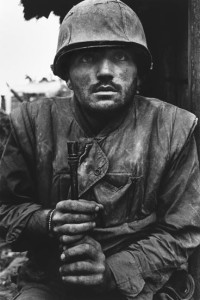 In Gods Go Begging, Alfredo Vea narrates the America’s most contested war, the fight against the communist regime in Vietnam, through the experiences of a solider belonging to the marginalized class and two women who lost their husbands in the war effort. These characters are unable to lead fulfilling lives because they are prisoners of their violent memories, which ruin every chance they have at redemption. Although possessing a collective memory is essential for societal progress, especially when it comes to issues of war, the intimate relation of these people with the Vietnam War prevents them from flourishing; they relive their traumas everyday. The presence of this memories create troubled characters whose past is as relevant as their present—those painful images of bloodshed and lost become gothic reminder of the ephemeral nature of life and the futility of hoping for happiness after the trauma of a war.
In Gods Go Begging, Alfredo Vea narrates the America’s most contested war, the fight against the communist regime in Vietnam, through the experiences of a solider belonging to the marginalized class and two women who lost their husbands in the war effort. These characters are unable to lead fulfilling lives because they are prisoners of their violent memories, which ruin every chance they have at redemption. Although possessing a collective memory is essential for societal progress, especially when it comes to issues of war, the intimate relation of these people with the Vietnam War prevents them from flourishing; they relive their traumas everyday. The presence of this memories create troubled characters whose past is as relevant as their present—those painful images of bloodshed and lost become gothic reminder of the ephemeral nature of life and the futility of hoping for happiness after the trauma of a war.
The protagonist, the clever attorney Jesse Pasodoble has difficulties dealing with reality thanks to the dominant presence of his traumatic memories from the war, which disrupt his present relationships and compromise his ability to cope with life beyond the battlefield. Jesse is an isolated young man despite his intelligence and caring nature. He favors solitude because engaging with others requires an awareness and mental focus he cannot master. The memories of his war experience corrupt the normalcy of even the simplest moments; his everydayness is filled with ghosts that refuse to abandon him. Vea uses his incessant memories to enhance the gothic atmosphere of his novel. Each location is described in grim terms of desolation and psychological darkness. Jesse’s room is an example of gothic style, Vea describes his room as “minefield of empty bottles” which Jesse has to cross to open a window which might allow him breath in the “air of the harsh present” (Vea,215). This haunted room is the perfect place for Jesse’s nightmares to emerge. Jesse experiences this unconscious excursions to the place of war with vividness which borderlines in reality; this impressive images leave him with a lasting and renewed feel of fear and impotence. “Last night his own living spirit had been kidnapped from his room and taken there… for a quick lesson, a reminder that his soul would never leave that hill” Jesse reflects, voicing his inability to move on from the trauma of combat. The cruelty of his memories is evident in this line, Vea personifies them as evil teachers that capriciously play with Jesse’s brain, never really bringing him to madness (which could take him back to that place “for a reunion” forever) but keeping his mind well enough to survive in normal society but not to live peacefully. Jesse concludes that despite the years, the different location, and his accomplishments, he would never be able to let go of his suffering and fear.
The murdered women Persephone and Mai are also victims of this psychological torture. Although their husbands fought at opposite sides, they nourished a friendship based on widowhood, a shared culinary interest and a need to start all over. This plan to move on seems to be working out rather well, however, they are still suffering and this grief is depicted throughout their lovely home. The portraits of their husbands decorate their walls, reminders of glorious times when solitude was an unknown malady. Persephone is still tormented by a photograph of her husband and her in the zoo because it brings back happy memories while emphasizing her current state after his death. The memory of an unfortunate miscarriage also assaults her precarious happiness; the pain she feels is so strong that she stops taking showers, since she lose her child while showering, and is forced to rant manically when she dares take one. Persephone’s monologue is her way of fighting the influence of memory and like a “boy walking through a cemetery fills the air with whistling “ she uses her loud voice as an antidote against silence and its consequential wave of fear (Vea,11).
Mia is also haunted by her past, though her pain is not so conspicuous. Her creepy treasures, the burnt trinkets that were given to her after her husband’s death, are evidently gothic. With these sad objects, which are placed in a visible space assuming a sentimentally powerful role in their home, Vea taints Mia’s lively character with a reminder of her pain and inner darkness.
These examples prove that in Gods Go Begging memories have a huge impact on the lives of the victims of Vietnam. These characters are deprived of their mental sovereignty by the ghosts of their past; memory forces them to perpetually relive the belligerent scenes that shaped them forever.
IMAGE CREDIT:
Shellshocked US Marine, Hue, Vietnam, Don McCulling.
